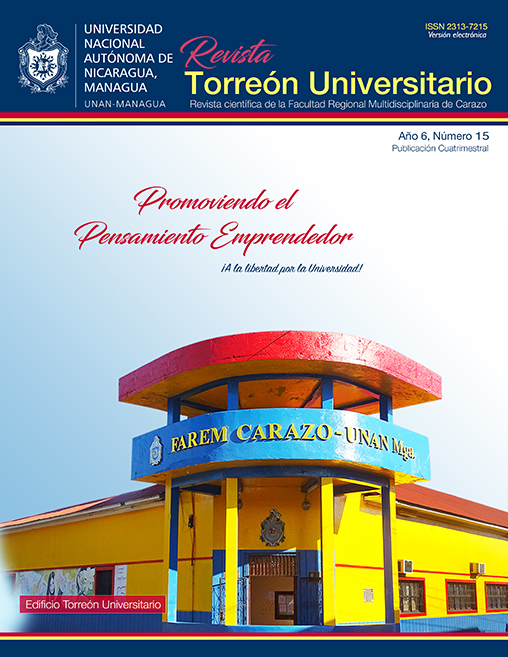Traditional Evaluation vs. Alternative Evaluation at FAREM-Carazo
Abstract
In the following sections, the topics related to educational evaluation, traditional and alternative assessment, innovative, democratic and cultural perspective will be addressed. The educational evaluation has been applied in a traditional way mostly, although there is also the alternative assessment approach that, as its name itself implies, has revolutionized the traditionalist approach to it. This has become innovative, to this is added its democratic character to be able to change its cultural perspective.
In the first instance, the educational evaluation has been defined by different authors using different elements that come to enrich that concept each day making it more complete and inclusive. Therefore, this has been applied in the school environment in a traditional way, this means that it is done through examinations and written tests in order to obtain a number that meet both parents and teachers´ expectations when allocating an amount to measure knowledge of their children and students.
Downloads
References
Arias Peñaloza, Milvia Lisette y Arias Lara, Sergio Alejandro. (2011). Evaluar los aprendizajes: un enfoque innovador. En Educere: Revista Venezolana de educación. Volumen 15. Número 51. Pág. 357 a 368. Recuperado de: http://www.redalyc.org/pdf/356/35621559006.pdf
Ávila, M., Calatayud, de Miguel, C. Canton, I., Catillo, S. & Zaitegui, N. (2010). La evaluación como proceso sistemático para la mejora educativa. Recuperado de: https://books.google.com.ni/books?id=OCwbAgAAQBAJ&pg=PA17&dq=evaluacion+alternativa+concepto&hl=es-419&sa=X&ved=0ahUKEwj1kcjOyMDSAhVS52MKHTIFCrIQ6AEIMDAE#v=onepage&q=evaluacion%20alternativa%20concepto&f=false
Brown, S. & Glasner, A. (2007). Evaluar en la universidad: problemas y nuevos enfoques. Recuperado de: https://books.google.com.ni/books?id=Ehzb7v4EG8sC&printsec=frontcover&source=gbs_ge_summary_r&cad=0#v=onepage&q&f
Bordas, M. & Cabrera, F. (2012). Estrategias de evaluación de los aprendizajes centrados en el proceso. En revista española de pedagogía. Número 218. Pág. 25 a 48. Recuperado de: https://dpegp.files.wordpress.com/2012/04/lectura-1-eva-apren.pdf
Carbajosa, D. (2008). Debate desde paradigmas en la evaluación educativa. Recuperado de: http://docenpostav.unan.edu.ni/pluginfile.php/3686/mod_resource/content/0/DEBATE%20DESDE%20LOS%20PARADIGMAS%20EN%20LA%20EVALUACION%20EDUCATIVA%20%20DIANA%20CARBAJOSA.pdf
D´agostino, Giusppa. (2007). Aspectos teóricos de la evaluación educacional. Recuperado de: https://books.google.com.ni/books?id=8ueTibkvwtwC&pg=PA17&dq=definici%C3%B3n+de+evaluaci%C3%B3n+educativa&hl=es-419&sa=X&ved=0ahUKEwjAjamY1cTSAhUqw1QKHaNaCp8Q6AEIHjAB#v=onepage&q&f=false
Falchikov, N. & Thompson, K. (2008). Assessment: What Drives Innovation? Journal of University Teaching & Learning Practice, 5(1).
Disponible en: http://ro.uow.edu.au/jutlp/vol5/iss1/5
UNAN-MANAGUA. (2011). Modelo educativo, normativa y metodología para la planificación curricular 2011Managua.
Mateo, J. & Martínez, Francesc. (2008). La evaluación alternativa de los aprendizajes. Recuperado de: http://www.ub.edu/ice/sites/default/files/docs/qdu/3cuaderno.pdf
Mora Vargas, A I. (2004). La evaluación educativa: Concepto, períodos y modelos. Revista Electrónica "Actualidades Investigativas en Educación". Recuperado de: http://www.redalyc.org/articulo.oa?id=44740211
Salinas, Bernardino. (s.f.). Evaluación de los estudiantes en la educación superior. Recuperado de: http://www.postgradoune.edu.pe/documentos/evaluacion/La%20evaluacion%20estudiantes%20en%20la%20ESuperior%20UV.pdf
Sanmartí, Neus. (2007). 10 ideas claves. Evaluar para aprender. Recuperado de: https://books.google.com.ni/books?id=BuAkkhRUtYgC&printsec=frontcover&dq=evaluaci%C3%B3n+educativa+neus+sanmarti&hl=es-419&sa=X&ved=0ahUKEwi8vMn8icPSAhUOxGMKHf84Ar8Q6AEIGjAA#v=onepage&q=evaluaci%C3%B3n%20educativa%20neus%20sanmarti&f=false
Santamaría Vizcaíno, Martin. (2005) ¿Cómo evaluar aprendizajes en el aula? San José, C.R. EUNED.
Tenbrink, Terry. (2006). Evaluación: Guía práctica para profesores. Recuperado de: https://books.google.com.ni/books?id=CJyeZusF6YIC&pg=PA18&dq=definici%C3%B3n+de+evaluaci%C3%B3n+educativa&hl=es-419&sa=X&ved=0ahUKEwiihs6-3cTSAhUHxFQKHQykBc4Q6AEIQjAI#v=onepage&q=definici%C3%B3n%20de%20evaluaci%C3%B3n%20educativa&f=false
Downloads
Published
How to Cite
Issue
Section
License
Los autores que publican en esta revista están de acuerdo con los siguientes términos.
- El autor o los autores de los artículos, ensayos o investigaciones conceden a la Universidad Nacional Autónoma de Nicaragua, Managua (UNAN-Managua) los derechos de edición (copyright) del trabajo enviado, por consiguiente la Universidad cuenta con el derecho exclusivo para publicar el artículo durante el periodo completo de los derechos de autor.
- Estos derechos de autor/ autores autorizan a la Revista Torreón Universitario y a la Universidad editar y divulgar/publicar el artículo en dicha Revista, incluyendo reproducción impresa y electrónica, el almacenamiento, recuperación y cualquier otro tipo de publicación, y fuentes de información secundaria como servicios de resúmenes y bases de datos, así mismo la facultan a proteger el artículo contra el uso no autorizado para su difusión por medios impresos o electrónicos (PDF, HTML, EPUB, XML u otros).
Licencia para el uso del contenido
La revista hace uso de la Licencia Creative Commons Atribución-NoComercial-SinDerivar 4.0 Internacional.
Bajo esta declaración:

Este revista está sujeta a una licencia de Creative Commons Reconocimiento-NoComercial-SinObraDerivada 4.0 Internacional. Puede ser copiada, distribuida y transmitida públicamente siempre y cuando se cite al autor y la fuente (Revista Torreón Universitario), no debe modificarse ni utilizarse con ningún fin comercial. La licencia completa se puede consultar en http://creativecommons.org/licenses/by-nc-nd/4.0/.

